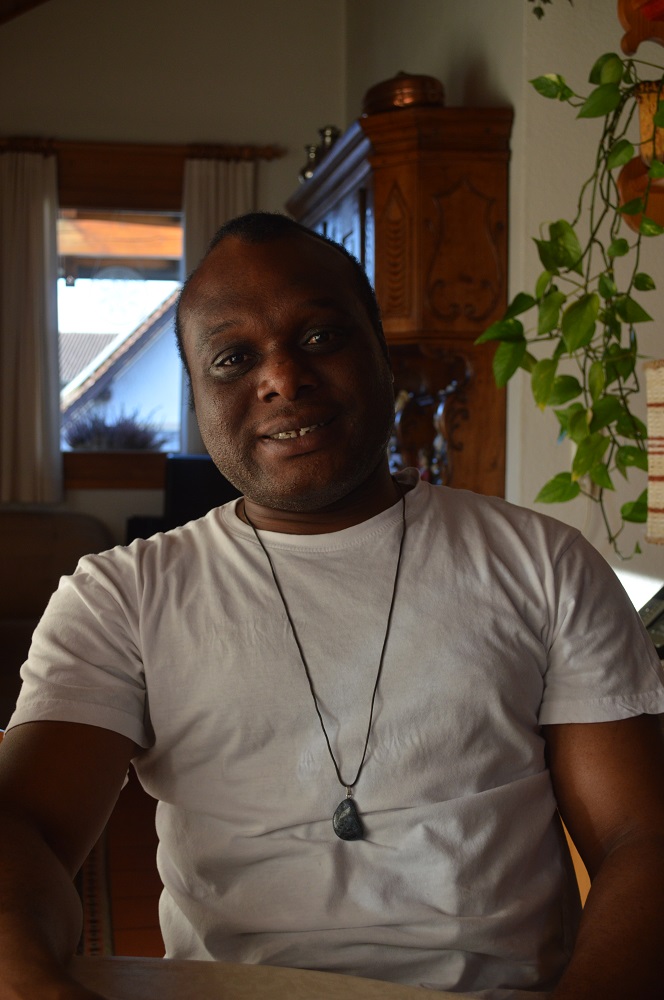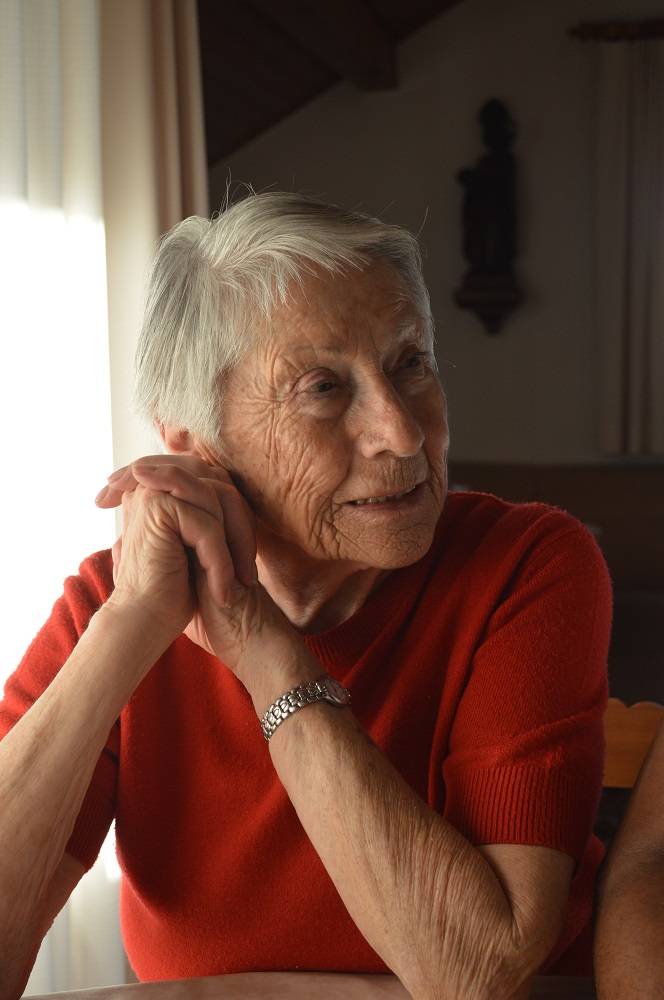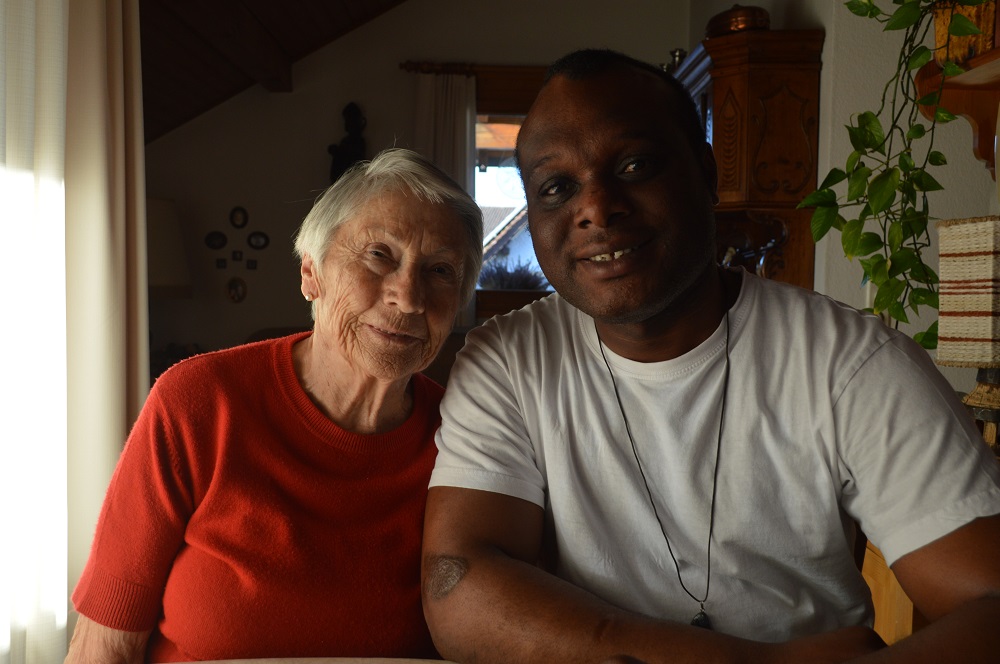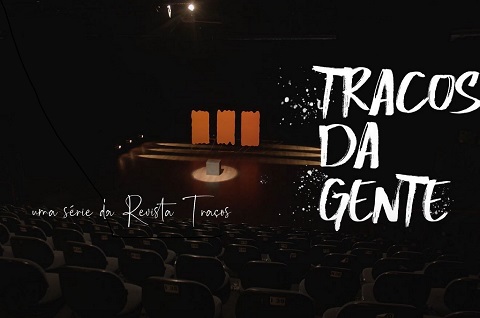Interview by Frank Andres
When Somadina Ifesinachi Okoye, or Kenneth, fled Nigeria to Austria in 2015, he was looking for a community to build a life in. What he found was Elsbeth Gaisbauer: a now 89-year-old woman who not only became his friend, but his adopted grandmother. Even though Elsbeth’s family was initially hesitant about Kenneth, over the years, he has become a staple in the Gaisbauer household.
However, after Kenneth failed to receive asylum in Austria, he must now return to Nigeria. As he prepares to leave, he’s not only facing the reality of having to start over again in his home country, but of having to leave Elsbeth and his new-found family as well.
Since his arrival, Kenneth has worked as a vendor for marie, his local street paper. The publication sat down with Elsbeth and Kenneth to talk to them one last time.
![The two have known each other for almost four years: Kenneth and his "grandmother", Elsbeth. [Credit: Frank Andres]](https://hub.insp.ngo/wp-content/uploads/2020/02/MAR_Vendor-and-his-grandma_1.jpg)
marie: How did you two meet?
Elsbeth: I saw Kenneth for the first time in March 2016 in front of the Hofer in Koblach, where he was selling marie. Back then, seeing a black person was like seeing a person from the moon! At the beginning, we chatted a little bit in English. That’s how it all started. Three days later, I went back to the supermarket and noticed that Kenneth was wearing worn out shoes and torn trousers.
Did you immediately buy new clothes for him?
Elsbeth: Not at first. I gave him a backpack and an umbrella for a start. At some point, I told him that we would go shopping for new clothes together.
But you didn’t really know him yet, did you?
Elsbeth: I had the feeling that I had known him forever. I thought he was nice, friendly, and not pushy at all when it came to selling his paper. At some point, Kenneth said to me: “You are like my mother.” I said thank you and told him: “I’m already 86 years old. You can call me grandmother.”
Kenneth, what was your first meeting with Elsbeth like?
Kenneth: When Elsbeth saw me for the first time, she looked deep into my eyes. She asked me what my name was and where I came from. She bought an issue of marie. Elsbeth was the first person to speak to me. That made me very happy. After that, she didn’t come to the supermarket for three days in a row. I was really worried. When I met her again, I told her that I had missed her.
Is Elsbeth a special person to you?
Kenneth: Yes; she’s my grandma. She cooks lunch for me and brings the food to the supermarket. She’s also invited me to her home many times. Her children and grandchildren accept me.
Was this acceptance there right from the start?
Elsbeth: Initially, my children warned me about Kenneth. They said I should be careful and that he is only nice to me because I give him presents.
Kenneth: But she never gave up. Elsbeth has always fought for me. She showed me the country. It helped me to integrate myself into Vorarlberg. I learned most of my German from her, and she’s showed me a lot of the local food. Every Friday, Elsbeth makes Käsknöpfle [traditional cheese pasta]. I love the Austrian cuisine.
Elsbeth: I’d like to say something else about acceptance. I always celebrate my birthday with my family in Frastanz. And for me, Kenneth has belonged there since 2016. That’s why I said to my daughter: “If Kenneth is not allowed to be there, then I won’t come either.”
Kenneth: I was at her birthday party on 1 August 2016, and I had a long conversation with her family. They’ve accepted me ever since. From then on, we’ve been celebrating birthdays and Christmas together. I’m a part of Elsbeth’s family.

What role did Kenneth’s life story play in this?
Elsbeth: None at all. I’m not one to interrogate other people. If someone wants to tell me something, I listen. I wasn’t interested in how Kenneth came to Austria. I care about the person who lives here now. Who he was before is of no concern to me.
But you knew that Kenneth applied for asylum in Austria. Did you support him with the application?
Elsbeth: His first application for asylum in August 2017 was rejected. We then appealed the decision and hired a lawyer. At the second hearing in August 2019, I went to Innsbruck with Kenneth, the lawyer, and my daughter. My daughter is an English teacher and was allowed to attend the trial. I had to wait outside. At first it looked like the decision would be positive this time. But in November 2019, we got a rejection letter.
What was the justification?
Kenneth: As a Nigerian, I have no chance of being granted asylum. Nigeria is considered a safe country of origin.
But you were persecuted by Boko Haram, a radical Islamic terrorist group, weren’t you?
Kenneth: That’s right. But the agency believed that I could live in another part of Nigeria where this Islamist terror does not exist. And besides, they said I am not a political but an economic refugee.
Elsbeth: Kenneth was accused of not integrating enough into Austria, that he was only a member of the beekeeping association in Feldkirch. But Kenneth was more involved than that. He volunteered to walk with people facing mental illness every week in Telfs in Tirol, where he lived.

Was there another way to appeal the second verdict?
Elsbeth: Yes, but it would have cost another €3,500, and the chances of success were zero. Kenneth always said: “If it is God’s will, then I’ll stay here.” But God obviously wants him to be in Africa.
What were your expectations when you came to Austria in 2015?
Kenneth: I wanted to live in peace here, work for this country, and start a family. That was my dream.
But your roots are in Nigeria.
Kenneth: That’s true, and I will never forget where I came from. I never could have imagined I’d be so deeply accepted in Vorarlberg. The people here looked after me, gave me their love. That made me feel like I was at home in Austria. There were of course people who saw me as a stranger who didn’t belong here, but that was the absolute exception.

What role has marie played in your life?
Kenneth: Without the street paper, I would never have met Elsbeth. I also want to thank marie for making an important contribution to my integration. marie helps refugees to regain their strength. Hardly anyone can imagine what it’s like to be without a job and to stare at the ceiling all day. I’ve always taken my work as a seller of marie seriously, and I loved doing it wholeheartedly.
Now it’s decided. You will be going back to Nigeria by mid-February at the latest. What does your future look like?
Kenneth: I fought for a future in Austria. Unfortunately, this dream hasn’t come true. If God doesn’t want me to stay here, He will show me a way in Nigeria. To appeal the judgement and to keep waiting was out of the question for me. I’m 31 years old, and I want to have a family. It’s better for me to return to Africa. Nobody can take away from me what I’ve learned in Austria in the past four and a half years. These experiences were very valuable. I don’t regret coming here, but I’m disappointed and sad that I have to leave.
Elsbeth, how do you feel about Kenneth leaving?
Elsbeth: I wish him all the best. I will miss him. My life will become boring. We’ll keep in touch via WhatsApp. That’s all I can say about that.




















